The official launch of the English asparagus season is traditionally St George’s Day (April 23rd) and to mark the occasion Side Salads and D.D.P Ltd invited a group of chefs who run kitchens for Elior and Lexington to a day on the farm with Andy Allen, whose Portwood Asparagus brand is prominent in wholesale markets around the country throughout the domestic season.
Although in 2025, it is a mainstay of kitchens and restaurant tables across the land Andy decided to switch a proportion of the family’s Norfolk farm over to asparagus 40 years ago, when very little was known about the crop. He began the day by reminiscing a little about his first steps into the relative unknown.
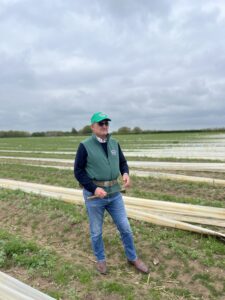 .
. 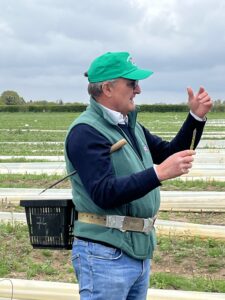
Andy Allen
“The few English asparagus growers there were at the time wouldn’t tell me anything, so that told me that there must be something worth pursuing,” he laughs. “And if I couldn’t learn from anybody here, the only way to find out was to travel. So, I did the backpacker thing and took in Australia, New Zealand, Mexico, Peru and parts of Asia. Everywhere I went I found out who grew asparagus and went to learn from them.
“When I came back in 1985, I put the first two and a half acres in and gradually built it up.”
Portwood Farm is a 1,000 acre farm, located in Great Ellingham, near Attleborough in Norfolk, of which around 900 acres is cropped. Around 240 of those acres are utilised to grow asparagus. “We now produce 200-250 tonnes of asparagus through our eight-week season. We’ve extended that a bit by using polythene to keep the wind off, the heat in and trick the plants into growing more quickly,” Andy says.
The trickery is necessary in most years because the crowns of the spears will not wake up naturally until the soil temperature is warm enough, which tends to be around the last 10 days of April. By putting recycled polythene on the beds and keeping the wind off the plants, the growing team ensures that the spears mature more quickly and importantly, remain straight. This can bring the season forward by 3-4 weeks, although this year colder than normal winds delayed that by 7-10 days across the country.
“On a hot day, asparagus spears can grow by 4 inches, you can almost watch it,” explains Andy. “On cold days, it hardly moves at all. By April 23rd, we would expect to be picking 900-1,100 crates a day, this year we were down at 400-450. It is so much more labour and capital intensive when the start of the season is like this – hence the higher prices than ‘outdoor’ crops. The polythene has to be pulled off and pulled back on every day, that’s a big job in itself.”
As a general rule though, the production cycle doesn’t change a great deal year on year. June 21st is the significant cut-off point, literally as it signals the end of cutting – Andy tells us that if you keep cutting any longer than that, you’ll stand a good chance of ruining the next year’s harvest.
Route to Market
Once you’ve nurtured the crop into peak performance, getting the product to market in perfect condition is, as with all crops, the key to making money. And Andy long ago recognised that his preferred route was to high-end retailers and chefs through the country’s wholesale market network.
“As a business, I started off supplying supermarkets. Putting it politely, I was messed about by a big chain in the early stages and vowed to never deal with them again. So, I changed direction to focus on wholesale markets,” says Andy.
“What English farmers have tended to do over the years is tell the customers what they have and that was that. I looked at it differently. I enjoy people and understanding who and what I’m producing for. I visited every wholesale market, talked to the salesmen and found out what they wanted for their customers. They didn’t want 12 1lb bundles shoved in a box, they wanted 10 250g bundles that fitted neatly into boxes.
“We pick seven days a week through the season. I then sell to Side Salads and to 11 other wholesale markets around the country six nights a week. Through that network of customers, we’re serving a huge range of customers in different sectors and it’s my job to make sure that they understand that what they are buying is suitable for them. To be ahead of the game, I start talking to my customers at 4am every morning – they will know what they need and we then put that all together for them that morning and ship it out that night for delivery the following morning.
“We don’t carry any stock; the logistics has got better every year over the last 40 years and we’re constantly trying to make this process as smooth as we can so that you (the chefs) get exactly what you want, when you need it,” he tells the group.
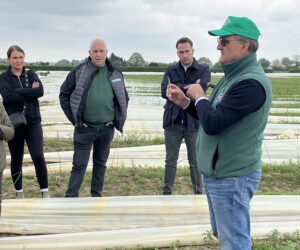
Paul Grimshaw, Nick Padley and Andy Allen
Nick Padley, who runs Side Salads at New Covent Garden Market, is the exclusive wholesaler partner of Portwood Asparagus in Nine Elms. “I believe Portwood Asparagus is the best of the best of the English crop,” says Nick. “His commitment to delivering consistently great product into the wholesale markets and his desire to get better every year really stands him out from the crowd.”
He backs up Andy’s claim to be different to many of his contemporaries in his outlook. “Generally, English growers do produce very good asparagus, but the attention to detail isn’t there. That’s what makes the difference to us as a wholesaler of premium products and brands – where the value is added throughout the chain is Andy’s willingness to invest in people and in his grading and packing systems, his meticulous operation procedures and the way he has worked with us to constantly adapt his brand and the packaging he sends to market to suit our customers.
“I’d say the biggest thing is the grading. A lot of Andy’s competitors – as he said – were happy to just bundle it, box it and send it off. But there is a science and art behind doing the job properly, and Andy has perfected that.”
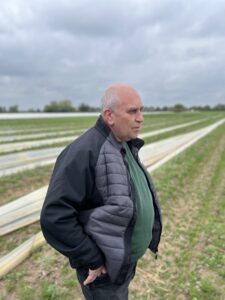 .
. 
The Elior and Lexington chefs are all customers of catering supplier Paul Grimshaw, D.D.P Ltd, who buys his asparagus through Side Salads but like several other catering suppliers has a close relationship with Andy too. “We’re lucky that Side Salads does a great job for us in Buyers’ Walk – that’s the beauty of the unique ecosystem we have here at New Covent Garden,” Paul says. “It then adds extra value to our business and to our customers that Side Salads are open to us getting to know their growers, fully understand what they do and most importantly, why they are exceptional.
“Any really is different – he takes the asparagus job to a different level and his commitment to the wholesale market channel shines through in the product we receive throughout the season. I am always in awe when he shows us round the farm – every time we come he’s changed something to improve the process. His first thought is not the money he can make from the crop each year, although of course he has to be profitable to remain sustainable. At the core of every decision he makes is my customer and what they need. That’s both impressive and reassuring; we know what we’re getting every time.”
Andy returns the complements to Nick, Paul and the chefs in attendance, saying: “To my mind, it’s what you all do that’s the science,” he says. “Cooking in particular is wizardry as far as I’m concerned!
What I learned from getting out there and meeting people was that the important thing to a chef when cooking asparagus was not the weight or the length, but the thickness, so we began grading by thickness, so that when you cook it, it cooks evenly. We gave each thickness a name, like Choice, Jumbo, Select etc… and we also colour coded all those names so if the chef can’t recall which grade is what, all they need to remember is the colour.
“Everyone used to want big fat spears, but supermarkets have educated people to think they get better value if they buy more spears,” adds Andy. “I can tell you that essentially it’s all the same, but if it’s grown in Britain, it takes longer to grow and you are guaranteed a far more intense flavour. Bite into it; you’ll notice the difference straight away.”
Four decades of perfecting the process haven’t quenched Andy’s thirst to get even better. “We’ll never stop searching for ways to improve. I’m trying to learn from them what the chef wants and it’s also important that chefs understand how it gets onto their plates, so days like this are crucial. Anyone who has a better way of doing what we do, I’m all ears!” he says.
It’s a decent bet that there aren’t many, if any, out there who can claim to know better than Andy.
Farming Today listeners hear how supply chain links support each other
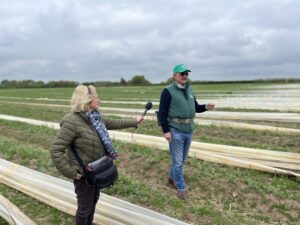
Anna Hill, presenter of Radio 4’s Farming Today programme, came down to interview Andy, Nick and Paul on the day and Andy explained the economic pressures faced by him and his English fresh produce growing counterparts.
In today’s heightened economic climate, it costs approximately £7,000 an acre to put plants in the ground and each plant has a soil-life of seven years. “Seventy-two per cent of my cost of production is labour,” said Andy, who has drilled down to microscopic levels to build an understanding of the value of his crop. “I need 110 people to plant, harvest and pack 200 acres. That costs me £29.04 a minute and the cost has gone up 9.7% in real terms this year, when you include national Insurance and holiday pay, for example. This all has to be passed on, otherwise we will not be here next year.”
Nick told Anna that he recognises his role in supporting English growers : “As a wholesaler, we want to do the best job for Andy because we want him to be here for many years to come. There are no new UK asparagus growers coming on the scene, if anything they are becoming fewer and farther between. Supporting Andy means we can also do the right job for our customer.
“We definitely pay more for Andy’s English asparagus than we would for imported asparagus. It’s premium product and it’s not mass produced as it would be overseas.”
Paul Grimshaw told radio 4 listeners that his customers depend on consistent, premium quality supplies: “The nature of our customer is that they demand the highest quality, but it has to be at the right price. What they do with the product is incredible, but equally what Andy does is incredible. We’re all links in the chain and if one of those links were to break, we’d all be in trouble,” he said.
“We’ve worked with Andy’s product for many years, we’re loyal and we like the fact that we can take chefs out and educate them a bit more. They all want British produce on their menu. We make a song and dance about the British season every year because the season is so short and it needs celebrating.”
Dish of the day
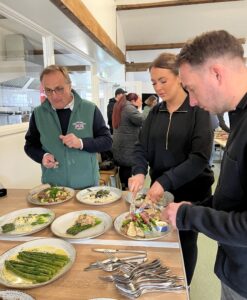 .
. 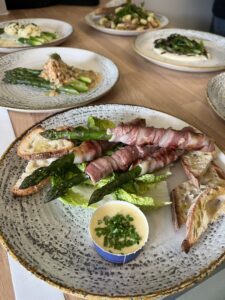
Having been introduced to the machinations of the wonderful world of the asparagus supply chain, the chefs were set to work on a Ready Steady Cook style challenge, which saw them split into groups and asked to create dishes from freshly picked asparagus and a variety of ingredients provided for them. The chefs represented a range of sites across London and the South East and the outcome was nine sumptuous dishes, which were judged on their appearance flavour and best use of asparagus. The overall winner was a Ham Hock risotto served with asparagus. The distinguished judges thoroughly enjoyed sampling the fare of the day!